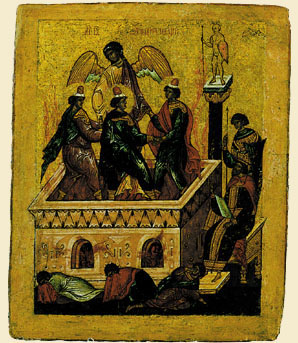Latin Catholics are accustomed to fasting once a year
at Lent. Historically speaking, there was a time when the tradition of fasting
was proposed a few more times a year than merely Lent, e.g., the Assumption fast, the Saints’ fast and the Advent
fast.
Liturgically speaking the time before any great feast of the Lord (i.e., Christmas & Easter), the feast of Saints Peter and Paul, and
also of Mary (Assumption of the BVM) was preceded by a distinct time of preparation: prayer, fasting almsgiving.
also of Mary (Assumption of the BVM) was preceded by a distinct time of preparation: prayer, fasting almsgiving.
In time, Catholics have relaxed some traditions and now they have become virtually obsolete. Think of the practice of Ember Days. Today, in fact, is the first of the three Advent Ember Days. You may have heard that the US bishops are encouraging the reinstitution
of abstinence on Fridays. Fasting and abstinence are different; do you know the
difference? What can we do to restore a reasonable practice of the Catholic faith that includes expanding our utilization of spiritual disciplines such as fasting? Can Catholics reinstitute the Ember Days in the praying of the Novus Ordo Liturgy?
of abstinence on Fridays. Fasting and abstinence are different; do you know the
difference? What can we do to restore a reasonable practice of the Catholic faith that includes expanding our utilization of spiritual disciplines such as fasting? Can Catholics reinstitute the Ember Days in the praying of the Novus Ordo Liturgy?
Abstinence is to go meatless; fasting is to have one main meal a day with two smaller meals. Eastern Christianity, Catholics and Orthodox, have a variety of ways to maintain these spiritual disciplines that make sense and shy away from a moralistic practice. That said, there are tendencies to go overboard on some things given our flawed human nature.
Today, the Advent fast –the Nativity fast– is kept mostly by Eastern Christians. The Advent fast is also called the Christmas Fast, as well as the Philip’s Fast. The Philip’s fast begins on the day following the Feast of Saint Philip (November 15) and concludes on the Vigil of Christmas (December 24). Like Lent, there is 40 day period of preparation. Like Lent, Advent is penitential, but not to the same degree as Lent is meant to be lived.
Our spiritual lives can’t be sustained with any dignity if we neglect the fundamentals proposed by the experienced spiritual people, the saints. The spiritual life requires us to rely more on Grace than on ourselves, and it requires us to live a life of conversion. Any conversion means a change of mind and heart; fasting gets us to think more deeply about the how we live our Catholic faith; we know that a conversion has rooted itself in us is demonstrated in our behavior.
A hectic season of holiday preparations and shopping, begs us to spend a period of time in prayer, fasting and almsgiving to adequately prepare for the Nativity of Our Lord.

